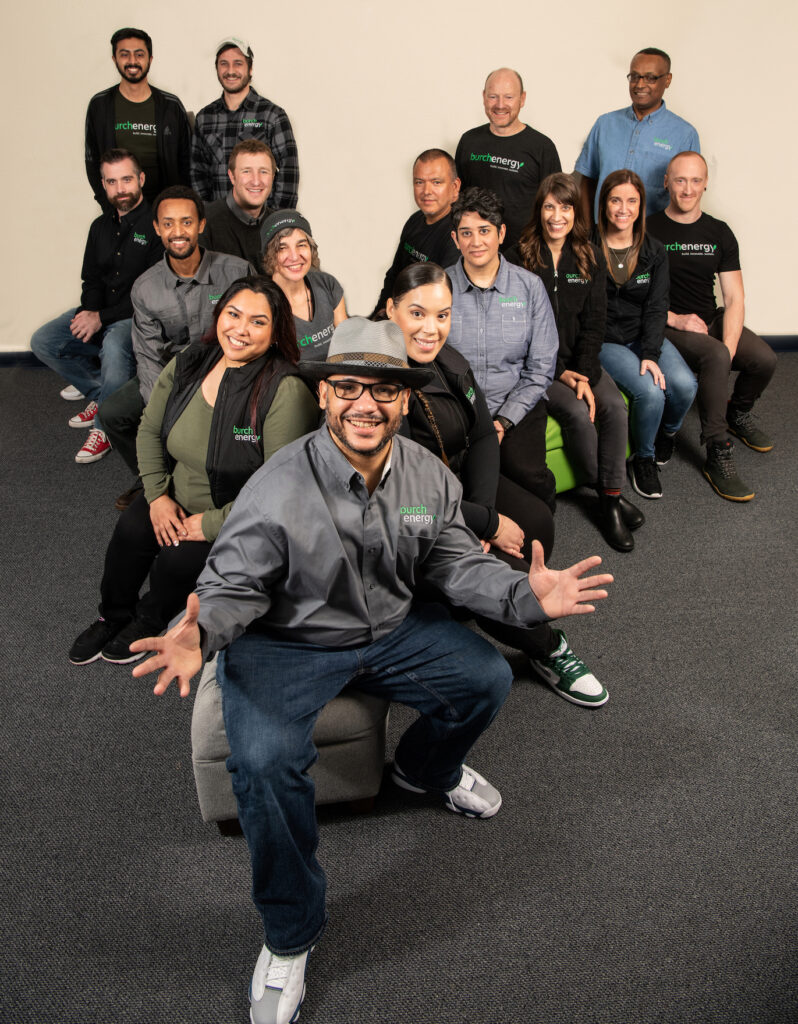
This is part of a series of blog posts amplifying community voices.
David Burchfield founded Burch Energy Services in 2020 to help Oregon builders transition more quickly to sustainability-focused HVAC systems. As a Black entrepreneur and employer, he is also working to increase diversity in green tech fields by helping other companies and contractors find BIPOC partners for projects. He’s energized by the possibilities for the future: eliminating the historic exclusion of certain groups and creating opportunities for jobs in clean energy that help families prosper, all while mitigating climate change.
Q: Did you have mentors or supporters in your life who contributed to your path and your success?
If it wasn’t for my wife, I wouldn’t be here. She believed when no one else did, and she makes our home such a happy place for me and our kids. Having that support is huge when you’re going to grad school and then building a business. And there’s my father-in-law, a white man who showed me that my love of math and physics could result in a career in renewable energy engineering. He was an important sounding board and support through my engineering program.
And starting in childhood, there was my father—a tenacious man who got his GED while serving in the Army, owned a house, retired, and then attended Portland State and got his bachelor’s degree. I don’t know how he did it, but it inspired grit and determination in me. I also have an uncle who founded and runs a tech company. Seeing him as a Black man in Chicago successfully managing a business helped me see what’s possible.
Q: When did you know you wanted to be an entrepreneur?
The first small company I worked for was NorthWrite, an energy information management company now owned by BuildingIQ. My boss, Dr. Patrick O’Neil let me do what I wanted to do as long as it met certain specifications. He’d tell me to figure things out, and that freedom to create solutions was enticing—the scariness, the unknown, and then actually accomplishing your goal. I knew from then on that I wanted to be an entrepreneur.
Q: What’s made you successful in your field?
A service attitude. I tell folks at Burch Energy to treat the janitor like the CEO and you’ll go much further. I respect the person more than the position. For example, it can be easy for engineers to bump heads with the designers and builders of homes and commercial spaces because we’re coming at projects from different perspectives. I want to get rid of that mindset. Instead of looking at differences, we can look at how we’re going to win if we work together. Contractors have a skillset I don’t have, and I respect it. I know how to make stuff work, but I don’t know how to make it look good.
Q: What do the words “climate” and “energy” mean to you, the community you serve, and the industry you’re in?
To me, these words represent an opportunity to make our world a better place, in all aspects: Through equity in an industry where minorities have historically been excluded. And in providing for our families with jobs in the clean energy revolution. It’s a win for the environment and a win for underutilized and underrepresented communities. It will help our communities mitigate the effects of climate change more quickly and efficiently.
Q: What are the biggest challenges you’ve faced in advancing sustainability efforts in your work?
What we need to do as individuals is get out of our own way. At the end of the day, that’s my biggest challenge. If I let fear drive my decisions, I’m going nowhere. I have to trust the process and remove the scarcity mindset. What I’ve noticed is that most of my problems start with me. When I address me, things start to work.
We have an all-hands-on-deck approach at Burch Energy, with our employees, and with our clients. I tell my Black brothers and sisters, the time is now—there are contracts and opportunities in the green economy, and there are no excuses for waiting for them to come to you. It’s part of my life’s work to make sure my community becomes part of the process and the system, and that their voices are heard in improving our infrastructure and built spaces.
Q: Would you say you’re disrupting old ways of thinking and doing business?
That’s exactly right. We are disrupting systematic racist processes in business and trying to help businesses be more equitable. If one of our partners says they can’t find minority contractors, I help find them. They often just don’t know how to look. Black folks often go to church and community centers to get information they trust. I show them how to network in communities beyond their own.
Q: What do you wish everyone knew about your work?
That we’re not just another engineering contractor. We want to create relationships and walk the path to sustainability with our clients. And that goes for the industry as a whole, too. We need to stay in contact with each other to evolve, to make sure new technologies integrate with existing technologies. Facilities management is an important part of sustainable energy solutions, and you need a true relationship to go on a journey together to make it work.
What is your advice to people of color entering green energy professions?
I’m not religious, but I am faith-oriented. And you’ve got to have faith while letting yourself be uncomfortable. Being out of your comfort zone can actually mean you’re in the right place, not the wrong place. Sit with the discomfort. Embrace it as a challenge. Career paths always present challenges. The people who can walk through their discomfort are the entrepreneurs and leaders. If you want to be an entrepreneur or leader, then discomfort is part of your future. You’ve got to want to jump into it.


